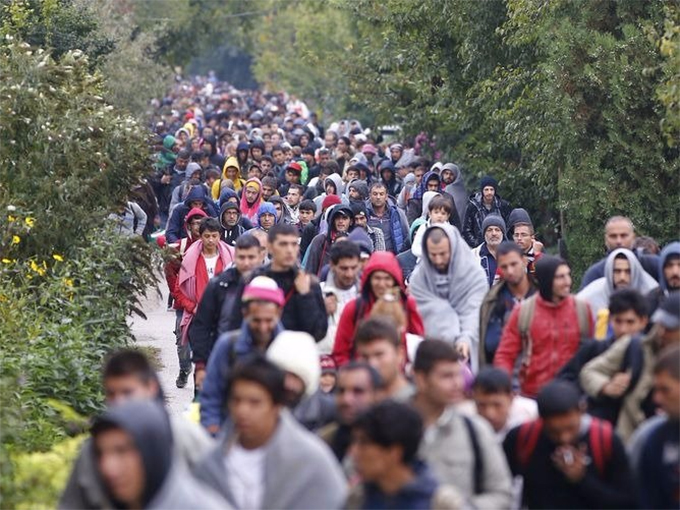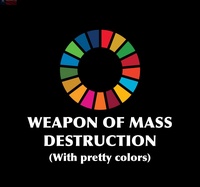Financial Times: Emigracija je dobra i nezaustavljiva, Afrika i Bliski Istok sele u Evropu
Page 1 of 3
Page 1 of 3 • 1, 2, 3 
 Financial Times: Emigracija je dobra i nezaustavljiva, Afrika i Bliski Istok sele u Evropu
Financial Times: Emigracija je dobra i nezaustavljiva, Afrika i Bliski Istok sele u Evropu
http://www.ft.com/intl/cms/s/64d058c4-b84f-11e5-b151-8e15c9a029fb,Authorised=false.html?siteedition=intl&_i_location=http%3A%2F%2Fwww.ft.com%2Fcms%2Fs%2F0%2F64d058c4-b84f-11e5-b151-8e15c9a029fb.html%3Fsiteedition%3Dintl&_i_referer=http%3A%2F%2Fwww.redicecreations.com%2F2f973843eef493bac71b92e8218487ff&classification=conditional_standard&iab=barrier-app#axzz3x1TjqixP

Kermit-

Posts : 26479
2014-04-17
 Re: Financial Times: Emigracija je dobra i nezaustavljiva, Afrika i Bliski Istok sele u Evropu
Re: Financial Times: Emigracija je dobra i nezaustavljiva, Afrika i Bliski Istok sele u Evropu
[size=31]Financial Times: Mass Immigration Is Unstoppable
[/size]2016-01-13 21:11
From: breitbart.com

The Financial Times has today published an article insisting that mass immigration from Africa and Asia into Europe is here to stay, so we’d better all get used to it.
The article goes so far as to suggest that the migrant crisis currently engulfing Europe is some sort of payback for European colonisation in the 18th and 19th Centuries, and predicts, with no sense of loss, that European culture will be overwhelmed.
Penned by the paper’s chief foreign affairs columnist, Gideon Rachman, the article spells out that, thanks to global demographic changes, Europeans are and will increasingly make up a rapidly diminishing proportion of the world’s population. That, paired with the ease of travelling to Europe in the modern age means that inward migration is set to be a way of life for the foreseeable future.
Not only does Rachman therefore see attempts to control immigration as futile, he further believes that attempts to preserve European culture are necessarily doomed to failure. European values, he believes, are modern liberal values with shallow roots which will not withstand an influx of what he terms Middle Eastern and African conservatism. That, he suggests, will be liberalism’s triumph.
“The migration of Africans, Arabs and Asians to Europe represents the reversal of a historic trend,” he writes.
“In the colonial era Europe practised a sort of demographic imperialism, with white Europeans emigrating to the four corners of the world. In North America and Australasia, indigenous populations were subdued and often killed — and whole continents were turned into offshoots of Europe. European countries also established colonies all over the world and settled them with immigrants, while at the same time several millions were forcibly migrated from Africa to the New World as slaves.”
Drawing a direct comparison between the migration methods of European colonialists, many of whom travelled for many months to establish new lives in the colonies, and the migrants currently heading into Europe, he tacitly intimates that Europe is now being colonised itself by an alien culture.
“When Europeans were populating the world, they often did so through “chain migration”. A family member would settle in a new country like Argentina or the US; news and money would be sent home and, before long, others would follow.
“Now the chains go in the other direction: from Syria to Germany, from Morocco to the Netherlands, from Pakistan to Britain. But these days it is not a question of a letter home followed by a long sea voyage. In the era of Facebook and the smartphone, Europe feels close even if you are in Karachi or Lagos.”
As a result, and despite the promises of European politicians in response to the horror of their citizens who know they are being colonised, resistance is futile.
The EU’s official policy is to allow genuine asylum seekers in, while returning illegal economic migrants. But the policy is doomed to failure. Not only are the number of countries deemed to be at conflict, either internal or external rising, creating more legitimate refugees, but Europe has so far proved itself incapable of dealing with illegal economic migrants who should, by rights, be sent home. Germany has only deported approximately 30 percent of its failed asylum seekers, for example.
Furthermore, Rachman writes, “once large immigrant populations are established, the right of “family reunion” will ensure a continued flow. So Europe is likely to remain an attractive and attainable destination for poor and ambitious people all over the world.
The outcome, he believes, is not only inevitable, but should be embraced.
“Europe’s debt-ridden economies need an injection of youth and dynamism. Who will staff their old-age homes and building sites if not immigrants from the rest of the world?
“But even those Europeans who make the case for immigration tend to argue that, of course, newcomers to the continent must all accept “European values”. That may be unrealistic, partly because many of these values are of relatively recent vintage.
“[P]ost-imperial, post-Holocaust Europe is much more wary of asserting the superiority of its culture. It has replaced a belief in its civilising mission and the Bible with an emphasis on universal values, individual rights and international treaties.”
“The big question in the coming decades is how Europe’s faith in universal liberal values will withstand the impact of mass immigration.”
Those decades will be characterised by “a battle”, he postulates, between “unpopular” conservatives and those concerned with preserving European culture – a group he dubs “the nativists” – and liberals.
He predicts: “In the long run I expect the nativists to lose, not because their demands are unpopular but because they are unenforceable.
“It may be possible for island nations surrounded by the Pacific Ocean, such as Japan or Australia, to maintain strict controls on immigration. It will be all but impossible for an EU that is part of a Eurasian landmass and is separated from Africa only by narrow stretches of the Mediterranean.”
For some, it appears, the destruction of the European way of life cannot come too soon.
[/size]2016-01-13 21:11
From: breitbart.com

The Financial Times has today published an article insisting that mass immigration from Africa and Asia into Europe is here to stay, so we’d better all get used to it.
The article goes so far as to suggest that the migrant crisis currently engulfing Europe is some sort of payback for European colonisation in the 18th and 19th Centuries, and predicts, with no sense of loss, that European culture will be overwhelmed.
Penned by the paper’s chief foreign affairs columnist, Gideon Rachman, the article spells out that, thanks to global demographic changes, Europeans are and will increasingly make up a rapidly diminishing proportion of the world’s population. That, paired with the ease of travelling to Europe in the modern age means that inward migration is set to be a way of life for the foreseeable future.
Not only does Rachman therefore see attempts to control immigration as futile, he further believes that attempts to preserve European culture are necessarily doomed to failure. European values, he believes, are modern liberal values with shallow roots which will not withstand an influx of what he terms Middle Eastern and African conservatism. That, he suggests, will be liberalism’s triumph.
“The migration of Africans, Arabs and Asians to Europe represents the reversal of a historic trend,” he writes.
“In the colonial era Europe practised a sort of demographic imperialism, with white Europeans emigrating to the four corners of the world. In North America and Australasia, indigenous populations were subdued and often killed — and whole continents were turned into offshoots of Europe. European countries also established colonies all over the world and settled them with immigrants, while at the same time several millions were forcibly migrated from Africa to the New World as slaves.”
Drawing a direct comparison between the migration methods of European colonialists, many of whom travelled for many months to establish new lives in the colonies, and the migrants currently heading into Europe, he tacitly intimates that Europe is now being colonised itself by an alien culture.
“When Europeans were populating the world, they often did so through “chain migration”. A family member would settle in a new country like Argentina or the US; news and money would be sent home and, before long, others would follow.
“Now the chains go in the other direction: from Syria to Germany, from Morocco to the Netherlands, from Pakistan to Britain. But these days it is not a question of a letter home followed by a long sea voyage. In the era of Facebook and the smartphone, Europe feels close even if you are in Karachi or Lagos.”
As a result, and despite the promises of European politicians in response to the horror of their citizens who know they are being colonised, resistance is futile.
The EU’s official policy is to allow genuine asylum seekers in, while returning illegal economic migrants. But the policy is doomed to failure. Not only are the number of countries deemed to be at conflict, either internal or external rising, creating more legitimate refugees, but Europe has so far proved itself incapable of dealing with illegal economic migrants who should, by rights, be sent home. Germany has only deported approximately 30 percent of its failed asylum seekers, for example.
Furthermore, Rachman writes, “once large immigrant populations are established, the right of “family reunion” will ensure a continued flow. So Europe is likely to remain an attractive and attainable destination for poor and ambitious people all over the world.
The outcome, he believes, is not only inevitable, but should be embraced.
“Europe’s debt-ridden economies need an injection of youth and dynamism. Who will staff their old-age homes and building sites if not immigrants from the rest of the world?
“But even those Europeans who make the case for immigration tend to argue that, of course, newcomers to the continent must all accept “European values”. That may be unrealistic, partly because many of these values are of relatively recent vintage.
“[P]ost-imperial, post-Holocaust Europe is much more wary of asserting the superiority of its culture. It has replaced a belief in its civilising mission and the Bible with an emphasis on universal values, individual rights and international treaties.”
“The big question in the coming decades is how Europe’s faith in universal liberal values will withstand the impact of mass immigration.”
Those decades will be characterised by “a battle”, he postulates, between “unpopular” conservatives and those concerned with preserving European culture – a group he dubs “the nativists” – and liberals.
He predicts: “In the long run I expect the nativists to lose, not because their demands are unpopular but because they are unenforceable.
“It may be possible for island nations surrounded by the Pacific Ocean, such as Japan or Australia, to maintain strict controls on immigration. It will be all but impossible for an EU that is part of a Eurasian landmass and is separated from Africa only by narrow stretches of the Mediterranean.”
For some, it appears, the destruction of the European way of life cannot come too soon.

Kermit-

Posts : 26479
2014-04-17
 Re: Financial Times: Emigracija je dobra i nezaustavljiva, Afrika i Bliski Istok sele u Evropu
Re: Financial Times: Emigracija je dobra i nezaustavljiva, Afrika i Bliski Istok sele u Evropu
kada mi netko kaže da se imigracija u Eu nemože zaustaviti..



Guest- Guest
 Re: Financial Times: Emigracija je dobra i nezaustavljiva, Afrika i Bliski Istok sele u Evropu
Re: Financial Times: Emigracija je dobra i nezaustavljiva, Afrika i Bliski Istok sele u Evropu
Šta, pobije umirovljenike? Puk'o je tj tvoj k'o kokica. Nego, šta je s njim, jel ima koji novi biser?

Guest- Guest
 Re: Financial Times: Emigracija je dobra i nezaustavljiva, Afrika i Bliski Istok sele u Evropu
Re: Financial Times: Emigracija je dobra i nezaustavljiva, Afrika i Bliski Istok sele u Evropu
ja ne zagovaram ništa što taj zagovara. pogotovo ne ovo sa penzićima kada mi je pola rodbine u penziji :D. ja sam budist, ja ne činim zlo.
samo kažem da za sve postoje rješenja koja se mogu implementirati u roku 24 sata
samo kažem da za sve postoje rješenja koja se mogu implementirati u roku 24 sata

Guest- Guest
 Re: Financial Times: Emigracija je dobra i nezaustavljiva, Afrika i Bliski Istok sele u Evropu
Re: Financial Times: Emigracija je dobra i nezaustavljiva, Afrika i Bliski Istok sele u Evropu
Stavit Mathauzen ponovo u pogon, ovaj put ne za Zidive a bogami ni za arape.

omni-

Posts : 7009
2014-04-12
Lokacija: : 9 krug
 Re: Financial Times: Emigracija je dobra i nezaustavljiva, Afrika i Bliski Istok sele u Evropu
Re: Financial Times: Emigracija je dobra i nezaustavljiva, Afrika i Bliski Istok sele u Evropu
FT zna, trpaj!

epikur37- Posts : 45339
2015-08-06
 Re: Financial Times: Emigracija je dobra i nezaustavljiva, Afrika i Bliski Istok sele u Evropu
Re: Financial Times: Emigracija je dobra i nezaustavljiva, Afrika i Bliski Istok sele u Evropu
eto, sama meta skace pred nisan
_________________
What looks like politics, and imagines itself to be political, will one day unmask itself as a religious movement (Soren Kierkegaard)

prckov- Posts : 34563
2014-04-18
 Re: Financial Times: Emigracija je dobra i nezaustavljiva, Afrika i Bliski Istok sele u Evropu
Re: Financial Times: Emigracija je dobra i nezaustavljiva, Afrika i Bliski Istok sele u Evropu
Nevjerojatno je što europska liberalna elita radi s kontinentom. fanatično dosljedni svojoj ideološkoj paradigmi pristaju na eksperiment koji će Europu bespovratno upropastiti.
Strašno.
Strašno.

epikur37- Posts : 45339
2015-08-06
 Re: Financial Times: Emigracija je dobra i nezaustavljiva, Afrika i Bliski Istok sele u Evropu
Re: Financial Times: Emigracija je dobra i nezaustavljiva, Afrika i Bliski Istok sele u Evropu
Starhemberg wrote:Šta, pobije umirovljenike? Puk'o je tj tvoj k'o kokica. Nego, šta je s njim, jel ima koji novi biser?
đe ga nađete sve je na portugalskom o pedru
_________________


marcellus- Posts : 46005
2014-04-16
 Re: Financial Times: Emigracija je dobra i nezaustavljiva, Afrika i Bliski Istok sele u Evropu
Re: Financial Times: Emigracija je dobra i nezaustavljiva, Afrika i Bliski Istok sele u Evropu
VIDEO: MUSLIM REFUGEES ATTACK FRENCHMAN, BUT HE HAS A SURPRISE...


VIDEO SHOWS A GROUP OF "REFUGEES" ATTACKING A MAN WHO THEY DO NOT KNOW HAS A CONCEALED CARRY LICENSE AND A FIREARM
FRANCE - As Muslim refugees flood into Europe the number of violent attacks has increased. The spikes have resulted in record demand for guns. A video has surfaced on the internet and shows French citizens being confronted by alleged North African Muslim immigrants armed with rocks, knives, and bats.
jastreb- Posts : 34059
2014-04-22
 Re: Financial Times: Emigracija je dobra i nezaustavljiva, Afrika i Bliski Istok sele u Evropu
Re: Financial Times: Emigracija je dobra i nezaustavljiva, Afrika i Bliski Istok sele u Evropu
Ovo je prestrašno!
Ljudi se više ni kod kuće ne osjećaju kao -kod kuće!!!
Ljudi se više ni kod kuće ne osjećaju kao -kod kuće!!!

jastreb- Posts : 34059
2014-04-22
 Re: Financial Times: Emigracija je dobra i nezaustavljiva, Afrika i Bliski Istok sele u Evropu
Re: Financial Times: Emigracija je dobra i nezaustavljiva, Afrika i Bliski Istok sele u Evropu
Ne znam o cemu pricas. Meni super... :)jastreb wrote:Ovo je prestrašno!
Ljudi se više ni kod kuće ne osjećaju kao -kod kuće!!!
_________________


Stanojko- Posts : 8340
2014-05-05
 Re: Financial Times: Emigracija je dobra i nezaustavljiva, Afrika i Bliski Istok sele u Evropu
Re: Financial Times: Emigracija je dobra i nezaustavljiva, Afrika i Bliski Istok sele u Evropu
Stanojko wrote:Ne znam o cemu pricas. Meni super... :)jastreb wrote:Ovo je prestrašno!
Ljudi se više ni kod kuće ne osjećaju kao -kod kuće!!!

jastreb- Posts : 34059
2014-04-22
 Re: Financial Times: Emigracija je dobra i nezaustavljiva, Afrika i Bliski Istok sele u Evropu
Re: Financial Times: Emigracija je dobra i nezaustavljiva, Afrika i Bliski Istok sele u Evropu
Por que você não fala português? Não é tão complicado.marcellus wrote:Starhemberg wrote:Šta, pobije umirovljenike? Puk'o je tj tvoj k'o kokica. Nego, šta je s njim, jel ima koji novi biser?
đe ga nađete sve je na portugalskom o pedru

Guest- Guest
 Re: Financial Times: Emigracija je dobra i nezaustavljiva, Afrika i Bliski Istok sele u Evropu
Re: Financial Times: Emigracija je dobra i nezaustavljiva, Afrika i Bliski Istok sele u Evropu
Zato će je početi napuštati ukoliko država i društvo ne naprave krajnji zaokret.jastreb wrote:Ovo je prestrašno!
Ljudi se više ni kod kuće ne osjećaju kao -kod kuće!!!

Guest- Guest
 Re: Financial Times: Emigracija je dobra i nezaustavljiva, Afrika i Bliski Istok sele u Evropu
Re: Financial Times: Emigracija je dobra i nezaustavljiva, Afrika i Bliski Istok sele u Evropu
Fénix wrote:Por que você não fala português? Não é tão complicado.marcellus wrote:Starhemberg wrote:Šta, pobije umirovljenike? Puk'o je tj tvoj k'o kokica. Nego, šta je s njim, jel ima koji novi biser?
đe ga nađete sve je na portugalskom o pedru
meni je kompicirano, jebiga...
_________________


marcellus- Posts : 46005
2014-04-16
 Re: Financial Times: Emigracija je dobra i nezaustavljiva, Afrika i Bliski Istok sele u Evropu
Re: Financial Times: Emigracija je dobra i nezaustavljiva, Afrika i Bliski Istok sele u Evropu
kakave novinarske dezinformacije protiv ovih jadnih ljudi koji su pobjegli od rata koji su ovi zapdnjaci i stvorili,no to je sve irelevantno,izbjeglice (prvi talas) ce biti zbrinute i naci ce svoj novi dom,dobro nam dosli
_________________
И показа ми чисту реку воде живота, бистру као кристал, која излажаше од престола Божијег и Јагњетовог.

Winter is coming-

Posts : 9181
2014-04-14
 Re: Financial Times: Emigracija je dobra i nezaustavljiva, Afrika i Bliski Istok sele u Evropu
Re: Financial Times: Emigracija je dobra i nezaustavljiva, Afrika i Bliski Istok sele u Evropu
Treba malo vremena, ali osnove se jako brzo pohvataju.marcellus wrote:Fénix wrote:Por que você não fala português? Não é tão complicado.marcellus wrote:Starhemberg wrote:Šta, pobije umirovljenike? Puk'o je tj tvoj k'o kokica. Nego, šta je s njim, jel ima koji novi biser?
đe ga nađete sve je na portugalskom o pedru
meni je kompicirano, jebiga...

"Za boljitak Hrvatske prvo treba promijeniti puno zakona a onda vam treba populacijska eksplozija. Svaka obitelj mora imati četvero ili petero djece. Ako pričao o najvećem problemu Hrvatske i Europe općenito to je mortalitet. Cijeli kontinent ima tendenciju pada, Europa nestaje, sve će vas zamijeniti ljudi iz Afrike i arapskih zemalja. Europa od prije 50 godina je puno drugačija nego danas. Bio sam u Parizu prošle godine i taj grad nema puno veze s onim od prije 20 godina. Tamo više nema Francuza. Hrvatska također gubi populaciju iz godine u godinu.
Prijeti vam izumiranje, a vrlo brzo ćete postati meka za mnoge emigrante iz svijeta. I kako onda investirati u zemlju kojoj će prosjek godina ubrzo biti 50. Nitko u Hrvatskoj ne želi raditi ništa, svi žele živjeti od mirovine. Stari ste, a uz to i bahati jer na sve ostale gledate s visoka. To je problem Hrvatske i Europe općenito. Imao sam planove investirati u Hrvatsku, ali razlog zašto ne želim je upravo taj, radije ću investirati negdje u Latinsku Ameriku gdje je prosjek godina 25 ili 27 godina. Ovdje svi ljudi žele biti oženjeni, svi žele imati djecu. To je osnova koja tjera čovjeka da radi jer mu je u toj situaciji potrebna kuća, cesta, škola za djecu... Razvoj! Da sam ja premijer Hrvatske moj bi plan bio na ovakav ili onakav način prisiliti građane da stvaraju djecu. To bih plaćao nekim bonusima. To je pitanje nacionalne sigurnosti jer ako tako nastavite za 20 godina će vam biti još teže. Imat ćete još više umirovljenika a još manje ljudi sposobnih za rad."
Indios izdominirao liberalnu Europu, haha. Nećete djecu, crknite!


Guest- Guest
 Re: Financial Times: Emigracija je dobra i nezaustavljiva, Afrika i Bliski Istok sele u Evropu
Re: Financial Times: Emigracija je dobra i nezaustavljiva, Afrika i Bliski Istok sele u Evropu
je gdje će se kotit europljani, u podstanarstvu u betonskom stanu od 48kvadrata
a btw latinska amerika se ne razvija baš.. osim čilea koji je neoliberalni kapitalizam.. brazil kao najveća ekonomija im je prdnila u čabar, argentici su konačno nakon 15 godina odbacili socijalizam, i ta zemlja je zbog socijalizma pred rasulom, isto je i sa venezuelom..
meksiko mi nije neki primjer, jebote tamo studentima glave obise na nadvožnjak, srednji i gonji sloj živi ograđen žicom..
osim neoliberalnog čilea, malo toga valjda tamo
a btw latinska amerika se ne razvija baš.. osim čilea koji je neoliberalni kapitalizam.. brazil kao najveća ekonomija im je prdnila u čabar, argentici su konačno nakon 15 godina odbacili socijalizam, i ta zemlja je zbog socijalizma pred rasulom, isto je i sa venezuelom..
meksiko mi nije neki primjer, jebote tamo studentima glave obise na nadvožnjak, srednji i gonji sloj živi ograđen žicom..
osim neoliberalnog čilea, malo toga valjda tamo

Guest- Guest
Page 1 of 3 • 1, 2, 3 
 Similar topics
Similar topics» Božo Ljubić pisao Izetbegoviću: Umjesto u Evropu državu islamizacijom vodite na Bliski istok
» Francuska: Marcon tvrdi kako je masovna emigracija nezaustavljiva i da Europa ne može ništa uraditi
» Bliski Istok - up to date
» Bliski istok stigao i u Canadu
» Papino hodocasce na Bliski Istok............
» Francuska: Marcon tvrdi kako je masovna emigracija nezaustavljiva i da Europa ne može ništa uraditi
» Bliski Istok - up to date
» Bliski istok stigao i u Canadu
» Papino hodocasce na Bliski Istok............
Page 1 of 3
Permissions in this forum:
You cannot reply to topics in this forum
 Events
Events Latest images
Latest images
 by Kermit Wed 13 Jan - 18:38
by Kermit Wed 13 Jan - 18:38